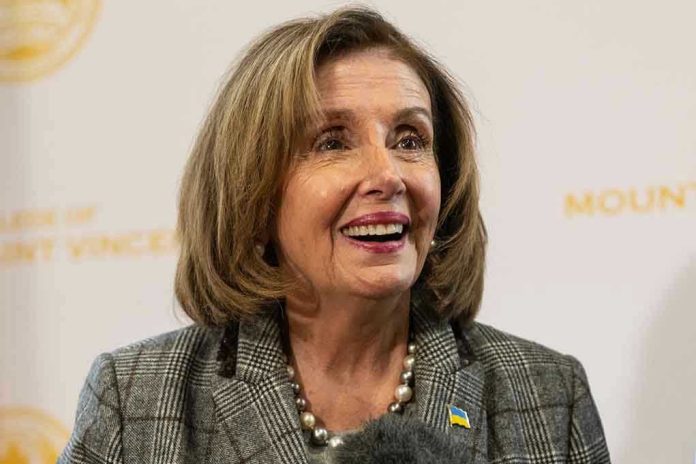
Pelosi’s sudden support for banning Congressional stock trading exposes Washington’s hypocrisy and sets the stage for a battle over ethics, personal freedom, and public trust.
Story Snapshot
- Nancy Pelosi, once criticized for stock trades, now backs the PELOSI Act banning Congressional stock trading.
- The Senate committee advanced the bill after a narrow 8-7 vote, with only one Republican supporting it.
- Bipartisan support and partisan tensions underscore a dramatic shift in Congressional ethics reform.
- The bill’s progress sparks debate about constitutional rights, government transparency, and the future of public service.
Pelosi’s Reversal: From Controversy to Reform Advocate
Nancy Pelosi, long at the center of Congressional stock trading controversy, shocked observers in August 2025 by publicly supporting the PELOSI Act—a bill that would ban lawmakers and their spouses from trading or holding individual stocks and options. For years, Pelosi’s trades were highlighted in watchdog reports and media investigations, fueling public outrage and bipartisan calls for reform. Her endorsement marks a dramatic reversal of past opposition and signals the growing momentum for Congressional self-regulation. The bill’s very name—PELOSI Act—reflects her prominence in the debate and the irony of her new stance.
The PELOSI Act moved forward on July 30, 2025, as the Senate Homeland Security and Governmental Affairs Committee advanced it by a slim 8-7 margin. Notably, every Republican except Sen. Josh Hawley voted “no,” exposing deep partisan divides despite bipartisan attention. Hawley, who introduced the bill, argued that restoring public trust requires banning all members from trading and holding stocks. Pelosi echoed calls for higher ethical standards, stating her support for serious efforts to reform public service. With the bill now awaiting action in the full Senate, the stakes have never been higher for Congressional accountability.
Congressional Stock Trading: A History of Scandal and Loopholes
Congressional stock trading has been a flashpoint for decades. The 2012 STOCK Act mandated disclosure of trades but stopped short of banning them, leaving loopholes that lawmakers exploited. High-profile trades during crises, like the COVID-19 pandemic, intensified scrutiny and public distrust. Past legislative attempts to ban trading repeatedly stalled in committee, fueling accusations of self-interest and corruption. The current push reflects a historic low in public trust and demands for transparency. Reform advocates insist that banning trading will prevent conflicts of interest and restore faith in government, while critics argue it infringes on personal financial freedom and deters qualified individuals from seeking office.
Bipartisan support for reform is matched by fierce resistance, with opponents questioning the necessity and constitutionality of a ban. Legal scholars warn that restricting lawmakers’ property rights may trigger constitutional challenges, and some worry enforcement mechanisms could be weakened over time—as happened with earlier reforms. The bill’s advancement, branded with Pelosi’s name, is seen as a “hell freezing over” moment, highlighting the shifting power dynamics and the pivotal role of high-profile leaders in driving change. President Trump has criticized Hawley for cooperating with Democrats, underscoring the ongoing partisan tensions.
Short- and Long-Term Consequences for Congress and the Public
If enacted, the PELOSI Act would fundamentally reshape how members of Congress manage their personal finances. Lawmakers and spouses would need to divest or restructure investments, potentially impacting financial advisors and asset managers. The public, weary from years of scandal and perceived self-dealing, may see the ban as a step toward restoring trust. However, the bill also raises questions about the balance between ethical standards and individual liberty—a debate central to conservative values. Campaigns and elections are likely to focus on candidates’ positions and compliance with new rules, making ethics a defining issue for 2026 and beyond.
Schweizer: Nancy Pelosi Supports Ban on Congressional Insider Trading — ‘Hell Is Freezing Over‘ https://t.co/9oPBkERcfw via @BreitbartNews
— Gisela BRINKMANN (@GiselaBrin43478) August 21, 2025
Economic ripple effects may follow, as lawmakers seek blind trusts and diversified funds to comply with new regulations. The precedent could influence ethics reforms in other branches or states. Meanwhile, watchdogs and transparency advocates largely support the ban, citing persistent conflicts of interest, while some financial experts call for clear guidelines on permissible investments. Ultimately, the bill’s fate will shape the relationship between Congress and the American people, testing whether meaningful reform can overcome entrenched interests and partisan divides.
Sources:
Stock trading ban on members of Congress advanced by Senate committee
Hawley advances PELOSI Act to ban Congressional stock trading out of committee
S.1879 – Ban Congressional Stock Trading Act












